- Home
- John Barth
The Floating Opera Page 11
The Floating Opera Read online
Page 11
And except for the infrequent parries with Charley Parks, the attorney next door, over our automobile suit—you’ll recall I mentioned it earlier?—I had done nothing else, no work at all on any case, since then: nearly a week. I was waiting for ’Stacia’s letter, and thinking steadily about possible alternative plans of action. I’d decided to sit thus until July 1. If nothing had happened to the jars by then, I’d take the risk of bribing R. J. Collier to destroy some of them.
Then, this morning, there was ’Stacia’s letter, one of the self-addressed envelopes I’d given her. It could contain anything from nonsense to the key to three million dollars, and it was merely as a disciplinary exercise that I’d postponed reading it until after I’d read the other letters and the handbill, and had called Marvin Rose. But I shan’t exact such discipline from you, reader. Here is the letter:
Mr. Andrew. Mrs. Mack, has put pickle jars in grenhouse. R. J. Coler, has put on zinas. Eustacia M. Callader. R. J. Coler, has put 72 bottles on zinas. Eustacia M. Callader.
I put the letter in the dossier with the other documents pertaining to the Mack will case, returned the dossier to the file, and locked the filing cabinets. For nearly two hours I stared at my wall, and then I left the office to stroll uptown for my appointment with Marvin.
A good morning’s work, readers: I opened a few letters and put one in the file. An excellent morning’s work for one’s last morning on earth, I should say.
My friend Harrison is three million dollars richer for it.
XI. an instructive, if sophisticated, observation
The thermometer outside the offices of the daily Banner read eighty-nine degrees when I walked past it on my way uptown. Few people were on the streets. At the curb in front of a large funeral parlor a black hearse was parked, its loading door closed, and several mourners, along with the black-suited employees of the establishment, stood quietly about in the yard. As I approached, an aged Chesapeake Bay retriever bitch loped from a hydrangea bush out onto the sidewalk and up onto the undertaker’s porch, followed closely by a prancing, sniffing young mongrel setter. I saw the Chesapeake Bay dog stop to shake herself in front of the door; the setter clambered upon her at once, his long tongue lolling. Just then the door opened and the pallbearers came out with a casket. Their path was blocked by the dogs. Some of the bearers smiled guiltily; an employee caught the setter on his haunches with an unfunereal kick. The bitch trundled off the porch, her lover still half on her, and took up a position in the middle of the sidewalk, near the hearse. The pair then resumed their amours in the glaring sun, to the embarrassment of the company, who pretended not to notice them while the hearse’s door was opened and the casket gently loaded aboard.
I smiled and walked on. Nature, coincidence, can be a heavy-handed symbolizer. She seems at times fairly to club one over the head with significances such as this clumsy “life-in-the-face-of-death” scenario, so obvious that it was embarrassing. One is constantly being confronted with a sun that bursts from behind the clouds just as the home team takes the ball; ominous rumblings of thunder when one is brooding desultorily at home; magnificent dawns on days when one has resolved to mend one’s ways; hurricanes that demolish a bad man’s house and leave his good neighbor’s untouched, or vice-versa; Race Streets marked SLOW; Cemetery Avenues marked ONE WAY. The man whose perceptions are not so rudimentary, whose palate is attuned to subtler dishes, can only smile uncomfortably and walk away, reminding himself that good taste is a human invention.
But it’s not easy to keep one’s patience in the face of the world’s abundant ingenuousness. For instance, when I came to the corner of High and Poplar Streets and stopped to chat awhile with Capt. Osborn and two of his cronies, installed on their loafers’ bench in front of George Melvin’s store, I had to put up with a prominent MEN WORKING sign near an open manhole in the street before them; a senile clock in the store window, which, like the store and the old men, had ceased to mark the passage of time; a movie-theater poster directly behind Capt. Osborn’s head, advertising a double bill— Life Begins at Forty and Captains Courageous; a pigeon perched restlessly on a NO PARKING sign—I could go on for a page. Really, to resist the temptation to use such ponderous, ready-made symbols taxes one’s integrity, and I’m certain that if I were writing stories for my bread and butter, my resistance would weaken. I recall once reading a story that ended with the hero dead on the floor—was he a suicide or a homicide?—beneath a cash register announcing: THIS REGISTERS THE AMOUNT OF YOUR PURCHASE. The machine, as one familiar with life’s elephantine ironies might have anticipated, registered zero, and I for one take it as a mark of the author’s lack of acumen that he couldn’t ignore that cash register, or make it read $4.37 or some other meaningless figure. It’s too easy otherwise, like using clichés.
So, reader, should you ever find yourself writing about the world, take care not to nibble at the many tempting symbols she sets squarely in your path, or you’ll be baited into saying things you don’t really mean, and offending the people you want most to entertain. Develop, if you can, the technique of the pallbearers and myself: smile, to be sure—for fucking dogs are truly funny—but walk on and say nothing, as though you hadn’t noticed.
XII. a chorus of oysters
Socially, as well as economically, Capt. Osborn and his colleagues of the loafers’ bench were exclusively consumers. They ate food, wore clothing, and smoked cigars, but they produced nothing. They sat immobile on their antique bench like a row of crusty oysters and ingested with their eyes everything that passed, but they did not participate. The life of Cambridge passed by and through them like sea water through an oyster’s gills: they strained from it what nutrition they wanted as it passed, digesting people and events with a snort or a comment, but they never moved from their position. They were a chorus of ancient oysters, stolidly regarding the fish that swam through their ken. Their infrequent voices were slow, nasal, high-pitched, and senile.
A bright blue roadster, for example, would roar by.
“Eee, there rides young Mowb Henly!” one would observe.
‘“E’s a hot one,” another would add. “Ol’ Mowb’s boy. Can’t do nothin’ with that youngster.”
“No, sir,” a third would agree.
“Eee, ol’ Mowb’s boy!” the first would repeat, rumbling his way up to a wet cackle of mirth and expectoration.
“ ’E’s bad as ’is ol’ man,” the second would remark.
“Ye know what they say,” would crow the third. “Like father, like son.”
The first would choke and strangle then, his red rheumy eyes a-twinkle, his red cracked face grinning, the small saliva spilling over his brown teeth and thin red lips, and begin the refrain again:
“Eee! Humph! Hawk! Sploo! Ol’—thoo! Thff! Ol’—Hawk! Thff! Thoo! Ol’ Mowb Henly! Thooie!”
I had a few minutes to spare, so I took a seat at the shady end of the bench—the old men liked the sun—and listened to their hoary music for a while. Presently the loaded hearse drove by from the funeral parlor, two cars with lighted headlights following behind. The procession paused at the intersection and then moved on through the red light, heading for Greenlawn Cemetery, out toward the country club.
“Whose funeral?” I asked.
“Why, that’s Clarence Wampler’s wife, ain’t it, Osborn?” offered my neighbor, watching the hearse move off.
“Yep,” assented Capt. Osborn. “Died Monday night.”
“That the Henry Street one, come from Golden Hill?” asked the third.
“Naw, that’s Lewis Wampler’s wife yer thinkin’ of,” Capt. Osborn declared. “Yer thinkin’ of ol’ Jenny Fairwell.”
“Ol’ Jenny?” the first cackled. “Ol’ Jenny?”
“Ol’ Jenny,” Capt. Osborn grinned, stretching his leg. “There was a hot one.”
“Ol’ Jenny!” the first snuffled happily.
“This here’s Clarence Wampler’s wife,” Capt. Osborn explained. “Lived on Ross Street, down by the cr
eek.”
“Sure,” the first said. “I b’lieve she was a Canlon, weren’t she?”
“Now let’s see,” Capt. Osborn mused. “She was the oldest Canlon girl—must of been Louise Mae.”
“Louise Mae Canlon. Hell, she weren’t so durned old, was she?”
“Louise Mae Canlon,” Capt. Osborn repeated. “She was the oldest—ol’ Cap’n Will Canlon’s girls, down to Golden Hill. Louise Mae Canlon must of been twenty when Clarence Wampler married ’er. I remember that was the year ol’ Cap’n Canlon lost ’is schooner in the ice—I was just startin’ out with my own boat that season, the June Phillips, I bought ’er off ol’ man George Phillips, down to Fishin’ Creek. That’d be ’bout 1885, I s’pect.”
“Cap’n Canlon’s schooner?” asked the third old fellow, who had remained silent. “Ye mean the Samuel T. Brice?”
“Naw, that was ’is ol’ boat,” Capt. Osborn declared. “I b’lieve the Samuel T. Brice burned up one time, tied up to Long Dock in Baltimore. This was Cap’n Will’s new boat—what was ’er name? LaVerne Canlon? After ’is wife. Well, sir, Cap’n Will hadn’t no more’n put ’er in the water, spankin’ new, ever’ line and whipstitch, ’fore we had that big freeze-up in the Bay, and be durned if ’e didn’t git froze up in ’er, and the ice wrecked ’er. Weren’t no icebreakers them days.”
“No, sir,” the others agreed.
“I durn near lost the June Phillips that winter, out off Sharp’s Island. Durn water was icin’ up so fast ye could watch it skim over, ever’ time the wind let off. Then the breeze would puff up and we’d go a-scrunchin’ a little farther. I had a extra-heavy chain for a bobstay, thank the Lord; I’d told Walter Jones to hang a big one on ’er when ’e was fittin’ ’er out, and I mean I didn’t know which would win, us or the ice. Thank the good Lord that breeze was up, kept us a-scrunchin’ right through, don’t no bobstay in the world would of cut that ice, I’m tellin’ ye.”
“Eee!” chuckled the first. “Don’t freeze up no more like that!”
“Ol’ Cap’n Jamie Snyder—you remember Cap’n Jamie? Cap’n Jamie Snyder says to me, ’e saw Walter Jones a-hangin’ that big chain bobstay on the June Phillips, up in ’is yard, ’e says to me, ‘Osborn,’ ’e says, ‘yer goin’ to need six darkies in yer dinghy,’ ’e says, ‘jest to keep ’er sailin’ trim!’ Well, sir, I says to Cap’n Jamie, ‘Cap’n Jamie, it looks like ice to me, this winter,’ I says, ‘and I’d a sight rather ship six darkies in my dinghy, than have to git out and walk home!’ “
“Eee!”
“Yes, sir!”
“Well, sir, I didn’t think no more about it,” Capt. Osborn went on. “Then come that big ice, and the June Phillips come a-scrunchin’ home from Sharp’s Island—took us till past dark—with that big bobstay jest a-chewin’ that ice like a lean hog corncobs, and a good load o’ oysters piled in the bow to give ’er weight. Next day I seen Cap’n Jamie down to the creek, lookin’ where the ice had ground the paint off the June Phillips’s cutwater, all round that chain, and a-shakin’ ’is head. ‘Osborn,’ ’e says, when ’e saw me watchin’ ’im, ‘I didn’t think nothin’ at the time,’ ’e says, ‘but I got to admit yer one up on me.’ ‘How’s that?’ I says. ‘Why,’ ’e says, ‘don’t ye know I left the B. John Gore fast in the ice yesterday, right off Horn Point, stuck like a minner in a gill net? Didn’t I walk ever’ step o’ the way from the B. John Gore to Sim Riley’s farmhouse, to git a horse, jest like ye said? I’m eatin’ humble pie, Osborn,’ ’e said. Then be durn if ’e didn’t laugh it off and buy me a drink. That was ol’ Cap’n Jamie fer ye!”
“Ol’ Cap’n Jamie!”
“Eee! Thoo!”
Poor Louise Mae Canlon Wampler: the oysters would, perhaps, sing of her another day.
I rose to leave, and then the same dogs that had done honor to the late Mrs. Wampler came trotting down to the loafers’ bench. The retriever waddled up to Capt. Osborn for an ear-scratching. The setter, ears back, tongue lolling, panted behind and attempted in his ardor to enter her from the side.
“Hoo there, feller!” wheezed one old man. “That ain’t no way!”
“Pshaw!” snorted another, embarrassed. “Look at ’em, won’t ye? Pecker’s a-winkin’ like the Cedar Point Light! Git on, there!”
“Don’t spoil ’is fun,” Capt. Osborn scolded with a grin. “ ’E’ll git old soon enough, or a car’ll hit ’im. Let ’im take it as it comes.”
“Hee hee hee!”
“Aw pshaw! Hawk! Thoo!”
Capt. Osborn even assisted the setter a trifle with his foot, shoving the dog’s haunches down to where his efforts might be rewarded. The setter set to with a will, while Capt. Osborn fondly scratched the retriever’s ear and the oysters snickered.
I chuckled too, and would have stayed to watch, but it was almost eleven-fifteen. I chuckled all the way up Poplar Street toward Marvin Rose’s office, thinking of animals in coito and of what had occurred in my bedroom on my seventeenth birthday. Behind my back I heard the oysters busily ingesting Cambridge:
“Hee!”
“Pshaw!”
“Thoo!”
XIII. a mirror up to life
My mother having died when I was seven years old, I grew up under the inconsistent tutelage of my father and a succession of maids and housekeepers. My father always expressed concern over my welfare and proper guidance, but from either necessity or disinclination he seldom gave me a great deal of personal attention. As for the maids and housekeepers, some liked me and some didn’t, but all had their own affairs to mind while Dad was working, and so I was left to myself much of the time.
I was almost never an ill-behaved child. I was quiet, but not uncommunicative; reserved, but not reclusive; energetic at times, but seldom enthusiastic. There were few restrictions on my behavior, nor were many needed. I was (and am) temperamentally disposed of observing rules—my desires seldom fell without their pale. And because I so rarely gave him cause for concern, my father was incurious about my activities.
Therefore, when I really wanted to do something of which I was certain he wouldn’t approve, it was not difficult for me to do it.
My sex life, reader, up to my seventeenth year, was so unspectacular as to be unworthy of mention. I did all the things that young anthropoids delight in while growing up; my high-school amours were limited to hot, open-mouthed kisses and much risque conversation—until my alliance with Miss Betty June Gunter.
Betty June, at age seventeen, was a thin, almost scrawny little thing, most ungainly and sharp in the face, with good eyes, crooked teeth, coarse blonde hair, fine skin, and no hips or breasts to speak of. She was not considered unattractive in my set, though socially she was certainly of an inferior caste. Betty June was a poor student but a spirited girl, and there was a sharpness in her speech that bespoke a mind livelier than those of a number of more scholarly girls in our class. Besides—and this was her chief attraction—Betty June was sophisticated, worldly, informed, in a way that none of the thoroughly respectable girls of my acquaintance could approach. Her father was dead, and her mother—one wasn’t sure what to think about her mother. The girl had little to do with her classmates, especially with the other girls, although there were a few notable exceptions: one or two girls of the most respectable sort claimed her as their close friend. We boys lusted after her with our eyes and our speech, of course, but before her cool, experienced manner we were clumsy and abashed. She regarded the lot of us as puppies, I’m sure.
The relationship between Betty June and me commenced when she fell in love with one Smitty Herrin, a twenty-seven-year-old bachelor who lived two houses from me. Smitty ignored her existence, she was devoted to him, and she got the habit that winter of spending much time in and about my house, hoping that Smitty would notice her. I was delighted. Betty June told me all her troubles—and they were dramatic, real troubles! Woman had never loved man, it seemed to me, as she loved Smitty, and yet he ignored her. She wouldn’t have cared what he did to her�
�he might beat her and curse her (a thrilling notion to a seventeen-year-old!)—if only he’d acknowledge her devotion, but he ignored her. She would even have suffered torture for him (together we dreamed up the tortures she’d be willing to suffer, considering each soberly); would even have died for him (we discussed, in detail, various unpleasant deaths) for the merest crumb of reciprocal passion. But Smitty remained oblivious. I was violently sympathetic, and helping her articulate her grievances I discovered that I could converse more easily and naturally with her than with anyone in my experience: there was no stultifying embarrassment, as there was with other girls, nor was there the necessity to impress that falsified all my communication with my male companions. Moreover, the things Betty June discussed were of a new and thrilling order—I felt mature and wise and confident, discussing them, and I found myself able to think more liberally, compassionately, and judiciously than I’d ever thought before.
In fact, reader, I should say that it was at just this point that I lost my innocence. Of what concern is it that eventually I made love to her? But Betty June, thin skinny Betty, she broke the seal of my mind, which had been before her coming an idle enough instrument; took from me my spiritual virginity, which is childishness and naïveté, and opened my eyes to the world of men and women—and this gently, and with warmth. A lucky virgin, I, to fall into those meager arms and pathetic problems; what she took from me, I lost with pleasure.
She came to the house nearly every afternoon, after school, and stayed until the housekeeper came to prepare supper. On Saturdays she often spent the whole day with me. We would sit alone, either in the living room or in Dad’s study—I preferred the study—and I would fix drinks for us, often lacing them with rum or whiskey filched from the butler’s pantry. And we talked and talked and talked, easily, sympathetically, wedding her experience with my articulation. I could feel myself expanding, maturing in the bath of her lean life, flexing the muscles of my rationality and my understanding. I’ve no real way of knowing how Betty June felt—whether she sensed the growing power in me or regarded me merely as a harmless colt.

 Final Fridays
Final Fridays Where Three Roads Meet: Novellas
Where Three Roads Meet: Novellas Every Third Thought: A Novel in Five Seasons
Every Third Thought: A Novel in Five Seasons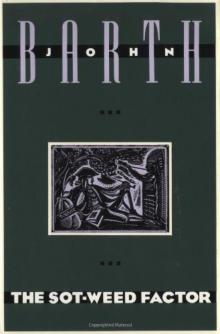 The Sot-Weed Factor
The Sot-Weed Factor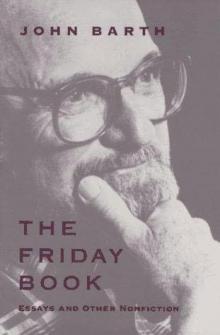 The Friday Book
The Friday Book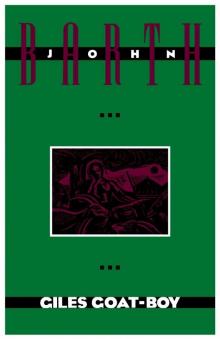 Giles Goat Boy
Giles Goat Boy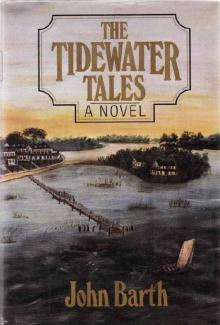 The Tidewater Tales
The Tidewater Tales The Development
The Development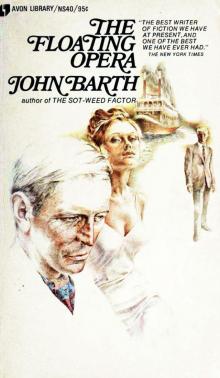 The Floating Opera
The Floating Opera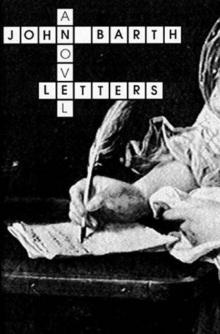 Letters
Letters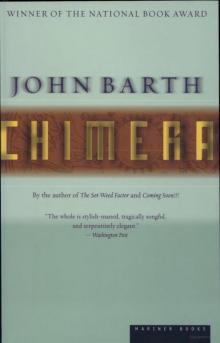 Chimera
Chimera Where Three Roads Meet
Where Three Roads Meet Every Third Thought
Every Third Thought